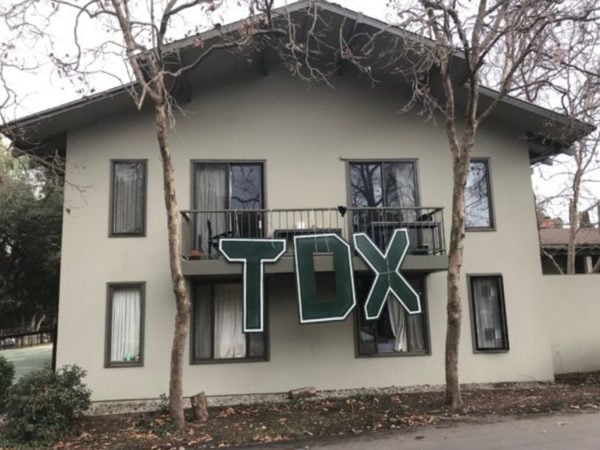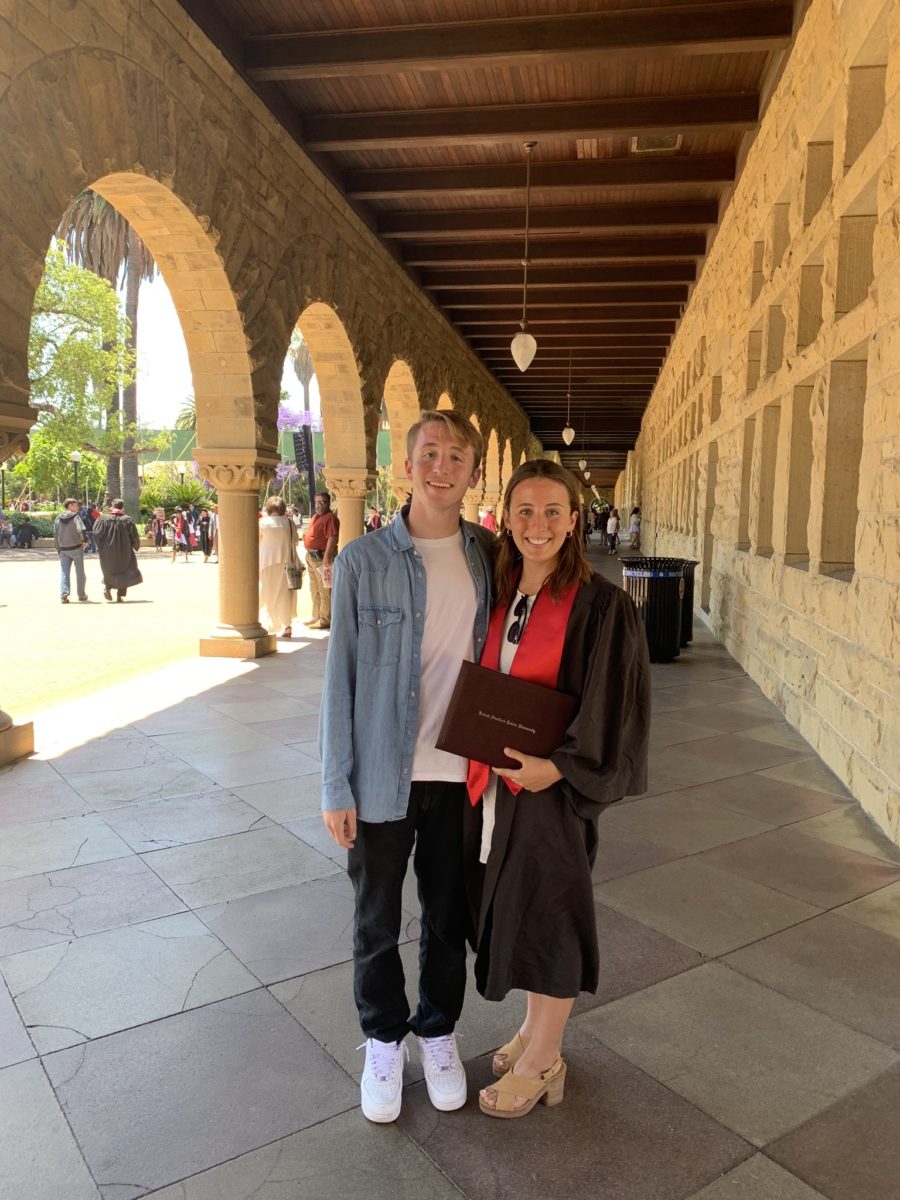This story contains references to death and drug overdose that may be troubling to some readers.
In January 2020, Eitan Weiner was found dead in the Theta Delta Chi (TDX) fraternity house after accidentally overdosing on fentanyl from ingesting counterfeit Percocet pills. After two years of seeking answers about Eitan’s death, his family has filed a wrongful death lawsuit against Stanford, the Theta Delta Chi Founders’ Corporation, three current students and a fourth unaffiliated individual.
Specifically, the family’s complaint, which was filed in Santa Clara County Superior Court in early December, alleges Stanford repeatedly failed to follow the University’s Residential Education policies in the days leading up to Eitan’s death on Jan. 17, 2020. The family is also arguing that Stanford and TDX neglected their duty to warn the student body of the risk of lethal counterfeit Percocets being circulated in Santa Clara County at the time.
Additionally, according to the lawsuit, neither of these lapses would have been possible if the University had heeded its own policies and taken action against what the lawsuit describes as “incontrovertible evidence” of serious drug use problems at the TDX fraternity. Had these steps been taken, the family said, Eitan would still be alive today.
In response to a series of questions from The Daily, a University spokesperson cited a Thursday statement, which reads, “Out of respect for Eitan’s parents, who are valued employees, the university is not addressing the specifics of each claim in the lawsuit nor elaborating on the chain of events that occurred. However, the university disagrees with many of the allegations in the complaint and will defend itself against the lawsuit.”
The Theta Delta Chi corporation and the four individuals named in the case did not respond to requests for comment about the allegations.
The family members, who are long-time Stanford affiliates, say they are looking for answers and respect from the University. Julia-Erwin Weiner, Eitan’s mother, is the associate vice president for medical center development at Stanford Medicine, and Amir Weiner, his father, works as an associate professor of history and directs the Center for Russian, East European and Eurasian Studies. His sister, Ya’el Weiner, graduated from Stanford in 2019.
Since Eitan’s death, Stanford has undertaken its own “comprehensive investigation,” separate from an initial criminal investigation, and has distributed increased messaging about the dangers of drug use, according to the public statement. Additionally, in March 2021, Stanford revoked University housing and recognition from the TDX fraternity for six years following an investigation that found that TDX failed to report to professional staff the presence of illicit substances in their house.
To Eitan’s family, however, these efforts are merely surface level changes from the University to save face. The policy changes are “performative,” Ya’el said — too little, too late. The family is now seeking legal recognition of the alleged misdeeds and compensation for the financial damages to the family.
“We’ve been waiting for two years for answers from someone, and no one wants to take accountability,” Ya’el said. “Stanford has tried to skirt around this by being silent.”
Law professor Robert Rabin, who specializes in tort law, said that the claims of wrongful death and aiding and abetting illegal drug transactions, if upheld in court, could result in considerable financial penalties for the defendants, especially Stanford and the TDX corporation.
“Reputationally, to go to litigation is a real cost for the University,” said Rabin. “With all of the bad publicity that’s involved, this is not the kind of a case I think that the University would want to litigate. But settling, which avoids some of those reputational costs, gives the signal that the University is open to the prospect of other claims that are brought down the road.”

Alleged University negligence
The family’s claims against Stanford include allegations of mishandling and negligence regarding Santa Clara public health warnings and inaction against the TDX fraternity.
When police officers entered the TDX house on the day of Weiner’s death, they found his body next to a blue powder as well as a pill in his room that matched the description of counterfeit Percocets laced with fentanyl that had been found in the county.
Four months prior, the county’s public health department issued a health advisory that the counterfeit pills had been found in circulation throughout the county. The lawsuit alleges that the University and the TDX fraternity exercised negligence by failing to widely distribute this warning to Stanford community members.
Rabin said this allegation could hold water given the special obligations the University and the fraternity have to students.
“If there’s a special relationship between the defendant and the plaintiff, then there is a duty not to be negligent in failing to adequately warn about the risks associated with what the Plaintiffs claimed,” Rabin said. “And of course there is a special relationship between Stanford and the students, and certainly between the fraternity and the students.”
The lawsuit additionally alleges negligence on the part of the University for not taking faster action against TDX, despite allegedly knowing of numerous dangers posed by the fraternity.
Both the University and the fraternity, the lawsuit alleges, were aware of continuous violations of Stanford’s substance use policies in the TDX house. But despite an alleged abundance of knowledge of these violations, the case states that the University repeatedly would “drag its feet in taking action against this toxic organization.”
As an example of this negligence, the lawsuit cites the University’s reversal of its decision to dehouse TDX.
In January 2019 — one year prior to Eitan’s death — the University placed TDX on probation for needing improvements to meet Stanford’s Standards of Excellence for the fourth year in a row. TDX was slated to lose its housing privileges by the end of the academic year.
But in the wake of a petition written by TDX that garnered 1,400 signatures, the University reversed its decision and restored TDX’s housing, citing a procedural flaw in the Standards of Excellence guidelines.
According to the lawsuit, the University’s decisions surrounding housing for TDX represent “pandering to donors and other interested parties.” University spokesperson Karla Hudson wrote that Stanford’s decision to reverse TDX’s campus housing status was not influenced by “donors and other interested parties.”

Overdose 36 hours before
The lawsuit also cites inaction from University officers in the days leading up to Eitan’s death. On Jan. 15, 2020, two days before Eitan died, he suffered an apparent overdose on the same counterfeit percocets he had received via a package sent to the fraternity house, according to the lawsuit. The University failed to take any action despite having knowledge of the reported overdose of illegal controlled substances in the house, the lawsuit alleges.
The pills, the lawsuit claims, were purchased by Eitan and three housemates from his childhood friend Matthew Carpenter. Carpenter was arrested in August 2021 on charges of a felony count of transportation, sale and distribution of a controlled substance, the complaint states.
The family is suing the three housemates, who are current Stanford students, for allegedly aiding and abetting Carpenter in purchasing, distributing and furnishing the pills that resulted in Eitan’s death, which the lawsuit states is a violation under the California Drug Dealer Liability Act.
During Eitan’s apparent drug overdose on Jan. 15, the lawsuit alleges that the acting resident assistant (RA) at TDX recognized that Eitan had lost both speaking and motor functions — both signs of a fentanyl overdose — and alerted the residence dean (RD) assigned to the fraternity, who allegedly redirected the RA to 9-1-1.
The family alleges that the RD did not take any action, and instead instructed the RA to contact the “on call” RD. The lawsuit levels the allegation against Stanford, not the RD, who is not named as a defendant in the lawsuit.
The lawsuit also alleges that in the days between Eitan’s initial overdose and his death, the three housemates “actively concealed evidence and misled first responders” regarding the presence, distribution and use of controlled substances in the TDX house. The students were again present on the day of Eitan’s death, when he ingested the pills previously purchased by the group, the lawsuit alleges.
Their allegations, if found true, would constitute violations of Stanford’s Fundamental Standard, TDX policies and procedures and federal and state law, according to the family.
“The fact is that everyone failed here,” Ya’el said. “Every single party, from Stanford, to TDX as an organization to the students and the so-called brotherhood who were meant to look out for one another.”

What’s next for the case
As Eitan’s family continues to push forward with the case, they do not plan to ease their demands for answers and legal accountability, according to Ya’el. The family said the lawsuit is the first step on a long road to rebuilding trust between the University and its community.
“We can’t even think about what this amorphous future of what a healthier, drug-using Stanford body is if we can’t hold accountable the people and parties who killed people using drugs when it could have been prevented,” Ya’el said.
As a civil case, the family will argue for financial redress, rather than criminal punitive measures against the defendants, according to Rabin, the law professor. The plaintiff may attempt to direct its claims against Stanford and the TDX corporation, as their pockets are far deeper than those of the students, Rabin added.
Still, Rabin noted, the claims of aiding and abetting against the three students and the allegation of a statutory violation under the California Drug Dealer Liability Act against Carpenter could be stronger and more straightforward to prove.
The next steps for the case are for the defendants to file an answer to the family’s complaint. If the parties do not reach a settlement prior, the suit will then go to the pretrial discovery before potentially being sent to trial.
Sophia Nesamoney contributed reporting.
